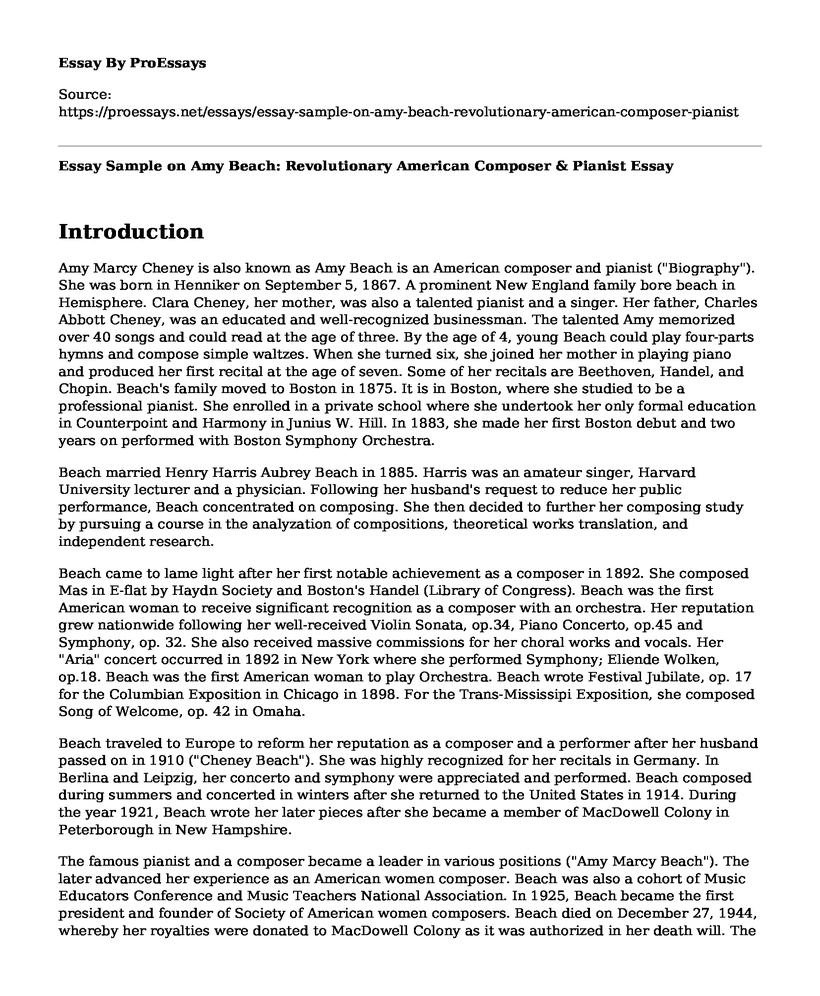Introduction
Amy Marcy Cheney is also known as Amy Beach is an American composer and pianist ("Biography"). She was born in Henniker on September 5, 1867. A prominent New England family bore beach in Hemisphere. Clara Cheney, her mother, was also a talented pianist and a singer. Her father, Charles Abbott Cheney, was an educated and well-recognized businessman. The talented Amy memorized over 40 songs and could read at the age of three. By the age of 4, young Beach could play four-parts hymns and compose simple waltzes. When she turned six, she joined her mother in playing piano and produced her first recital at the age of seven. Some of her recitals are Beethoven, Handel, and Chopin. Beach's family moved to Boston in 1875. It is in Boston, where she studied to be a professional pianist. She enrolled in a private school where she undertook her only formal education in Counterpoint and Harmony in Junius W. Hill. In 1883, she made her first Boston debut and two years on performed with Boston Symphony Orchestra.
Beach married Henry Harris Aubrey Beach in 1885. Harris was an amateur singer, Harvard University lecturer and a physician. Following her husband's request to reduce her public performance, Beach concentrated on composing. She then decided to further her composing study by pursuing a course in the analyzation of compositions, theoretical works translation, and independent research.
Beach came to lame light after her first notable achievement as a composer in 1892. She composed Mas in E-flat by Haydn Society and Boston's Handel (Library of Congress). Beach was the first American woman to receive significant recognition as a composer with an orchestra. Her reputation grew nationwide following her well-received Violin Sonata, op.34, Piano Concerto, op.45 and Symphony, op. 32. She also received massive commissions for her choral works and vocals. Her "Aria" concert occurred in 1892 in New York where she performed Symphony; Eliende Wolken, op.18. Beach was the first American woman to play Orchestra. Beach wrote Festival Jubilate, op. 17 for the Columbian Exposition in Chicago in 1898. For the Trans-Mississipi Exposition, she composed Song of Welcome, op. 42 in Omaha.
Beach traveled to Europe to reform her reputation as a composer and a performer after her husband passed on in 1910 ("Cheney Beach"). She was highly recognized for her recitals in Germany. In Berlina and Leipzig, her concerto and symphony were appreciated and performed. Beach composed during summers and concerted in winters after she returned to the United States in 1914. During the year 1921, Beach wrote her later pieces after she became a member of MacDowell Colony in Peterborough in New Hampshire.
The famous pianist and a composer became a leader in various positions ("Amy Marcy Beach"). The later advanced her experience as an American women composer. Beach was also a cohort of Music Educators Conference and Music Teachers National Association. In 1925, Beach became the first president and founder of Society of American women composers. Beach died on December 27, 1944, whereby her royalties were donated to MacDowell Colony as it was authorized in her death will. The most talented composer, although she did not have children to continue her legacy is preceded by her composing and pianist legacy.
Works Cited
"Amy Marcy Beach." Encyclopedia Britannica, www.britannica.com/biography/Amy-Marcy-Beach. Accessed 28 July 2019.
"Amy Marcy Cheney Beach (1867-1944) A Bibliography of Research Prepared by Esther Megargel." pp. 1-20, sites.lib.byu.edu/musref/wp-content/uploads/sites/54/2011/03/AmyBeachBiblEdited.pdf. Accessed 28 July 2019.
"Biography (Abridged)." AMY BEACH (1867-1944), 11 Apr. 2016, www.amybeach.org/about/biography/. Accessed 28 July 2019.
Library of congress. "Amy Beach (1867-1944)." The Library of Congress, www.loc.gov/item/ihas.200153246/. Accessed 28 July 2019.
Cite this page
Essay Sample on Amy Beach: Revolutionary American Composer & Pianist. (2023, Jan 30). Retrieved from https://proessays.net/essays/essay-sample-on-amy-beach-revolutionary-american-composer-pianist
If you are the original author of this essay and no longer wish to have it published on the ProEssays website, please click below to request its removal:
- Compare and Contrast Essay on World War I and World War II
- Justice in Disguise in Middle Passage by Hayden Essay
- Essay Sample on Economic Expansion From the Gilded Age to the 21st Century
- Essay Sample on Shirin Ebadi: Nobel Peace Prize Winner & Human Rights Pioneer
- Abraham Lincoln's Emancipation Proclamation: The Turning Point of the Civil War - Essay Sample
- Essay Example on Mahatma Gandhi: A Rebellious Life of Political Success
- Essay Sample on Einstein's Concept of Relativity of Simultaneity







